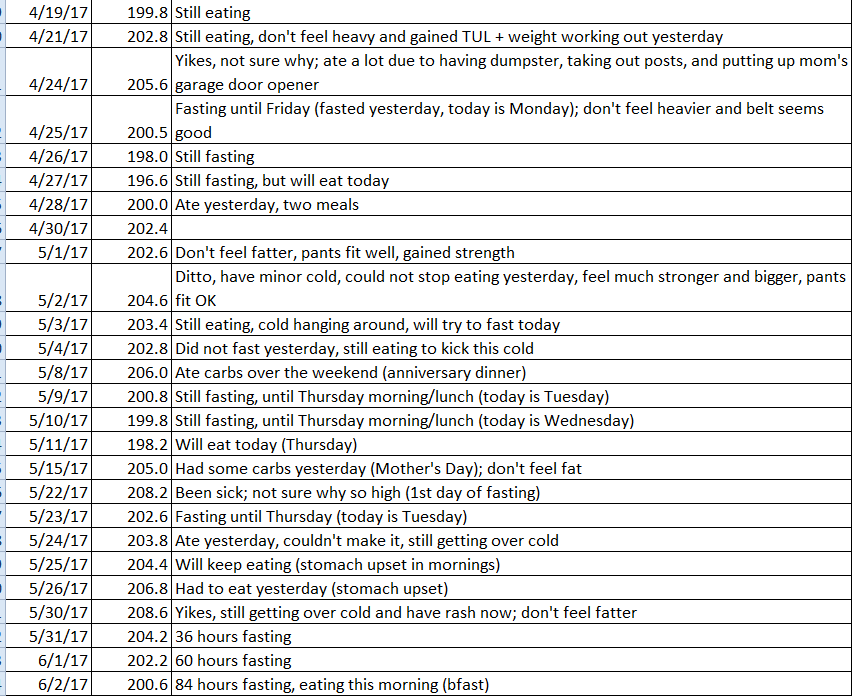This is an email I sent to my friend that I want to cc here because it seems associated with my daily cocoa butter bolus this week.
The last several days, whatever I eat (which is not really incorporating the extra-SFA theory yet, I’m eating what I have), I have a protein drink when I wake up (part of a meditation), then several hours later I eat all my daily food fairly at once or within about an hour, and with that meal (which is my last) or right after it, I have the cocoa butter coffee. Once, I had two meals separated by hours and had the second half of my coffee with the second meal, first half with the first meal.
So far it has worked fine and I’m very satiated. Even the next morning I’m not hungry.
Today I skipped the morning protein, and had my CB coffee then instead. Then I had my food as one meal to include a protein drink, around 4:30-5pm. I didn’t even think about it… so what.
Around 7:40 I basically passed out. I was sitting with my computer and just… gone into ‘abrupt severe sleep.’
I recognize that blood sugar crash. Before I lost so much weight, I was much more inclined to do that if I ate pasta or something for example. And after I first lost a bunch of weight super fast, I was getting reactive-hypo even to high protein and fat meals (like eggs and sausage) – not uncommon in people who’ve lost a lot of weight suddenly, and eggs especially can trigger it. Anyway I should not be getting BG drop severely like that for either reason.
I would not even be awake now (despite waking up 3x but being so deep in my brain state I could not bring myself out) at like 10:45pm except apparently every emergency siren in my city was called to something and had to go down main straight past my house (I’m on a frontage road about 500yd from main/route66). And even then it wasn’t until the last of them went past that I was finally able to drag myself up to alertness. And I was not sleep deprived mind you.
That is super bizarre and scary. I mean… I did not eat anything too weird and I did not eat anything unusual and this does not normally happen to me now, that hasn’t happened in years!
The one thing that IS diff is that
a/ I ate most things pretty close together like a 1MAD diet, so there’s more body-impact from doing that, and
b/ I did the CB coffee hours before all that – instead of with it or after.
I guess if you had a hard blood sugar response to something, would SFA modify the body response, by telling the cells they could skip accepting fat, so the glucose gets converted to triglycerides and then wanders around staying in the blood. But without the SFA, the insulin stuffs all energy into the fat cells, perhaps if the triggered insulin response was much too high, does it so overly-well that suddenly you have far too little energy in the blood and now you’re hypo. Like an exaggerated version of the basic model we talked about at first.
(Now my brain is wondering. If under severe, growing nearly diabetic conditions, the insulin resistance in fat cells from being over-stuff causes the insulin to keep working to find a place to stuff it somewhere, and so it does it in skeletal muscle and organs, which is bad… Why is it not doing that in our new SFA model, but instead it’s all wandering the blood, and the insulin is like oh well, whatever, and laying off?)
(Now I’m also wondering, does giving the fat cells the regular ability to control their own fat intake, so over some time they get used to being INsensitive with that control; does that somehow potentially make them MORE insulin-sensitive when they suddenly don’t have that control anymore?)
Tomorrow I am going to eat exactly what I did today, except instead of having the CB coffee in the morning, I am going to drink it starting just after I eat. I want to see if there is a difference, which there seems to be, but I need to put it against the same foods at the same time of day for a better test.
I cannot think of a single example right now, unfortunately, but the back of my brain is telling me that I have run into things before in life where, when you finally ‘give proper control’ or improvement to something, that if you suddenly remove that control or improvement, often the result is much more extreme/worse than it had been to begin with.
To analogy it in human psyche terms, like when things get much better in some area in your life, and you suddenly realize how good it can be and how bad it was, and then later when the bad situation returns, it seems much worse, and you are way less tolerant of it.
So now I’m wondering if having consistently had this bolus of SFA present just after I’ve eaten, has somehow made me more insulin sensitive when I do not have that.


 I know that there is some work done on what reduces visceral fat vs. subcutaneous fat (
I know that there is some work done on what reduces visceral fat vs. subcutaneous fat (
